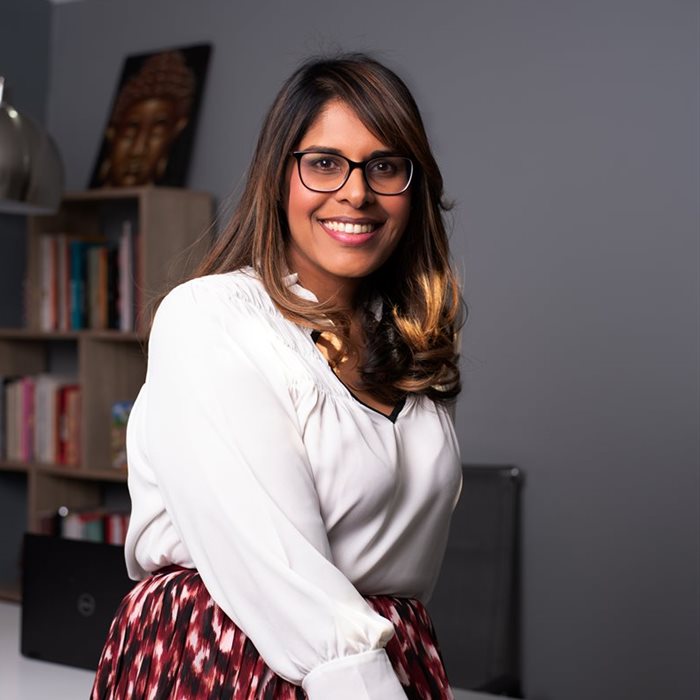In 2021, Kamini Redhi was included in the Most Influencing Marketing Leaders List by the World Marketing Congress. In 2022, she was acknowledged as one of Africa's Most Inspirational Women in Leadership.

Source: Supplied. Mastercard's Kamini Redhi.
As marketing and communications vice president for Mastercard, sub-Saharan Africa, Redhi shares the lessons learnt on her journey, and talks to leadership, innovative strategies and policies to bolster diversity within companies and to create opportunities for future generations.
 How did your former role as marketing manager at Coca-Cola Africa working across Coca Cola's hydration portfolio as well as on brand Coca-Cola for South, Central and East Africa prepare you for your role at Mastercard?
How did your former role as marketing manager at Coca-Cola Africa working across Coca Cola's hydration portfolio as well as on brand Coca-Cola for South, Central and East Africa prepare you for your role at Mastercard?My current role as the vice president of marketing communications for sub-Saharan Africa oversees the strategic direction, development, execution and performance of all marketing and communication activities for Mastercard across the region.
This includes finding new and disruptive ways to communicate with our consumers and customers – cardholders, banks, fintechs and merchants to scale digital-payments behaviour adoption across sub-Saharan Africa with the ambition to create a cashless society.
My role at Coca-Cola was great because as a marketer, driving behaviour adoption is a common thread across these industries. I was able to transfer these skills and the knowledge into a new industry.
Our continent is so diverse, and every region has its nuances that need to be considered in how to communicate.
This role gave me insight into how the different markets behave which assisted me in applying my new skills at Mastercard to these African markets.
Of course, having a fantastic team that I work with across marketing and communications at Mastercard ensures we are always pushing the needle and delivering fantastic content into the markets.
 August is Women's Month in South Africa, a time to celebrate and honour South African women. Mastercard recently launched its "She is Priceless" campaign to celebrate the everyday heroes striving for change, breaking barriers, and creating opportunities for future generations with their courageous and ambitious projects. Can you share some insight into this campaign?
August is Women's Month in South Africa, a time to celebrate and honour South African women. Mastercard recently launched its "She is Priceless" campaign to celebrate the everyday heroes striving for change, breaking barriers, and creating opportunities for future generations with their courageous and ambitious projects. Can you share some insight into this campaign?With so many selfless, determined South African women living out their dreams today, there's no shortage of inspiring stories to share.
In a new video series – called She is Priceless – we’ve spotlighted four real-world women role models - Pontsho Maruping, Thato Mugonda, Megan van der Merwe, and Queen Manyike – who demonstrate to viewers that regardless of age, gender or background, there are no limits to what is achievable.
The campaign also serves to highlight the multiple roles women play in our society with Mastercard being a key conduit to sharing their priceless stories.
On top of showcasing these wonderfully successful women, we’ve partnered with the Cape Wine Auction Trust which collaborates with other organisations across the Cape wine routes to raise funds for foundations that support education programmes for young girls and women.
The trust also helps promote gender equality, poverty eradication, and inclusive economic growth on the Cape wine routes, generating donations that will directly benefit women-led organisations that boost productivity, increase economic diversification and income equality, and improve social development outcomes.
 I know that Mastercard has long been an advocate for women’s rugby and has been supporting the women’s game for years. Why is gender equality in sport important? How has Mastercard locally been supporting the growth and development of women’s rugby?
I know that Mastercard has long been an advocate for women’s rugby and has been supporting the women’s game for years. Why is gender equality in sport important? How has Mastercard locally been supporting the growth and development of women’s rugby?Women’s rugby is one of the fastest growing team sports across the globe, with more than 2.7 million women and girls playing the game - more than a quarter of all players. Women are watching the game too.
40% of the sport’s 400 million fans are women, and some of the best players are right here in South Africa.
Despite these gains, inequality and exclusion still hold women back. Often, the data we rely on to create the future doesn’t capture women’s experiences.
We fail to spot the barriers that prevent women from seizing the possibilities we create; be it from being accurately and adequately represented in the media, receiving financial support to compete at an international level, or getting access to the right equipment, training kit and coaching methods designed to meet their unique needs.
Mastercard is tackling these challenges head on and has been championing women’s rugby for years – be it through our sponsorship of grassroots women’s rugby, to the Rugby World Cup 2021.
In South Africa, we initiated Start Something Priceless in women’s rugby where our global Mastercard ambassadors Bryan Habana and Dan Carter surprised the Pirates women rugby club players with a coaching clinic in 2019.
Then in 2020, we deepened our commitment to grassroots women’s rugby in South Africa by sponsoring the Golden Lions rugby union amateur women’s club league, the women’s Pirates grand challenge, and the Lions’ senior women’s team.
Our sponsorship funding gives players access to training and match-day kit, equipment, and coaching clinics. Lastly, we announced Piwokuhle Nyanda and Chanel Alberts as our Mastercard women’s rugby ambassadors.
By investing in grassroots clubs and players, we are able to directly contribute much-needed resources where we can make a significant difference while raising the visibility and appeal to a broader range of fans and enthusiasts and encouraging more women to join.
 I see that you are passionate about equipping school girls with the foundational science, technology, engineering, and mathematics (STEM) knowledge and skills they need for their studies and career success as fraud detectives, data scientists and software engineers. Tell me more about how you are ensuring girls in schools across Africa have access to a STEM curriculum? Could you tell me more about your Girls4Tech programme?
I see that you are passionate about equipping school girls with the foundational science, technology, engineering, and mathematics (STEM) knowledge and skills they need for their studies and career success as fraud detectives, data scientists and software engineers. Tell me more about how you are ensuring girls in schools across Africa have access to a STEM curriculum? Could you tell me more about your Girls4Tech programme?STEM education is so important, especially for young girls and women because in the greater scheme of things it helps narrow the gender pay scale, increases women’s economic security, diversifies talent in the STEM industry and reduces biases in products and services produced.
While more girls are showing an interest in these fields, and more women are pursuing STEM careers than ever before, the gap remains wide between men and women. In fact, global stats show that 80% of jobs created in the next decade will require some combination of STEM skills. Yet only 30% of the science and technology workforce currently comprises women.
“We need women at all levels, including the top, to change the dynamic, reshape the conversation, to make sure women’s voices are heard and heeded, not overlooked and ignored.” - Sheryl Sandburg
In South Africa, STEM skills are still the most in-demand jobs in the job market, yet only 13% of graduates in STEM fields are women.
Barriers to women in STEM can be overcome if we – as parents, teachers, counselors, STEM workers and others of influence – are there to educate and encourage them at key moments in their lives.
Mastercard is working to make a difference through programmes such as Girls4Tech, our signature STEM education platform, which strives to narrow the gender gap and develop a strong pipeline of talent for the future by cultivating young technology enthusiasts through mentorship and opportunity.
Our employees act as mentors and role models to give these girls, aged between 7 and 12, the confidence they need to excel. So far, we’ve reached more than 2,500 in South Africa, Nigeria, Kenya and Ghana. This is something that I am very proud to be part of – a real programme impacting real lives and making a meaningful difference.
 Let’s talk about leadership, what innovative strategies and policies do you think companies can implement to ensure diversity within management?
Let’s talk about leadership, what innovative strategies and policies do you think companies can implement to ensure diversity within management?Companies must make gender equality and diversity a central, guiding theme, not only in their diversity and inclusion efforts and hiring practices, but in their business strategy and leadership. This commitment must be explicit and measurable.
At Mastercard, for example, we link our management goals and KPIs to diversity and inclusivity, creating accountability.
In addition, it is important to get more women into senior roles and have a series of initiatives or actions in place across the company to help achieve the goal of a balanced workforce at all levels.
For example, when hiring externally, insist on having a diverse slate of candidates, and put in place internal leadership programmes to help existing women employees progress into senior leadership roles.
Having women in your workforce is one thing, but you also need to ensure that your workplace is wired for equality. For us at Mastercard, a starting point was setting a global precedent for maternity leave where we made it equal time off for men and women.
This helps level the playing field now that a man on a team could request the same time off as a woman when having a baby and any unconscious bias that may have existed and prevented women from being considered for opportunities are now irrelevant.
Progressing towards equal pay for equal work is another way we can level the playing field, with our female employees earning R1 to every R1 men earn. While these initiatives began at a leadership level, they ultimately all end with our employees, their lived experiences and workplace culture.
































 How did your former role as marketing manager at Coca-Cola Africa working across Coca Cola's hydration portfolio as well as on brand Coca-Cola for South, Central and East Africa prepare you for your role at Mastercard?
How did your former role as marketing manager at Coca-Cola Africa working across Coca Cola's hydration portfolio as well as on brand Coca-Cola for South, Central and East Africa prepare you for your role at Mastercard?



